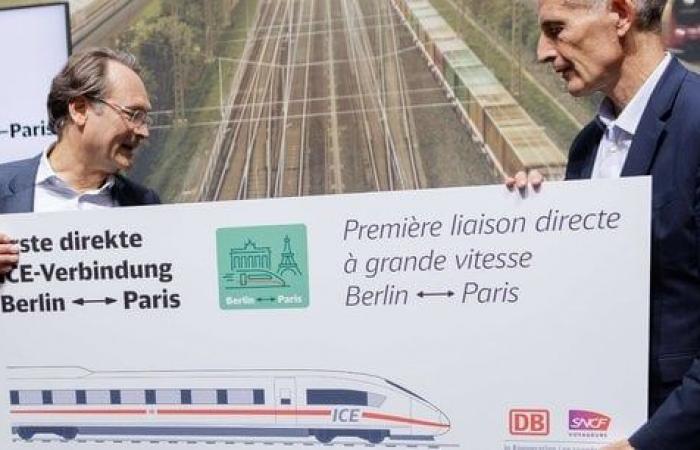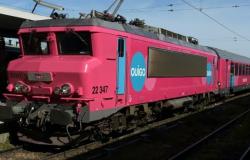
This is a first. HAS From Monday, it will be possible to directly connect Paris to Berlin by high-speed train. A gamble for this eight-hour journey which goes in the direction of a more integrated rail Europe.
A first train will leave Gare de l'Est, in Paris, at 9:55 a.m., in the presence of Jean-Pierre Farandou, CEO of SNCF and Anja Shöllman, director of production at Deutsche Bahn. Expected arrival in Berlin at 6:03 p.m., after a little over eight hours of travel. In the opposite direction, an inaugural train will leave Berlin on Monday at 11:54 a.m. He will arrive in Paris at 7:54 p.m.
“I say to the railway workers: stay on the side of the French” (Jean-Pierre Farandou, president of the SNCF group)
SNCF Voyageurs and Deutsche Bahn announced this new connection in September, with one train per day in each direction and an entry price of 59.99 euros in second class, and 69.99 euros in first class. This new line will cover some 1,000 kilometers separating the two capitals, with speeds of around 260 km/h on the German network, compared to 320 km/h in France.
A first
« For the first time in railway history between the two countries “, the two capitals Paris and Berlin “ will be directly linked from city center to city center, at high speed », underlines the SNCF. “ This new Paris-Berlin link (…) will also connect the European city of Strasbourg and the German federal capital for the first time at high speed. », adds the company.
SNCF and Deutsche Bahn are attempting the Paris-Berlin daytime trip in eight hours
On the German side, it will also serve the Frankfurt and Karlsruhe stations. The connection will be provided by ICE, German high-speed trains, and not by French TGVs. The two rail operators insist on the ecological argument, emphasizing that a Paris-Berlin train trip emits 2kg of CO2 per passenger, compared to 200 kg for a plane trip.
Attract “slow travel” enthusiasts
This new line was announced at the end of September, on the first day of the Innotrans railway exhibition. Asked about the length of the journey, compared to the less than two hours taken by the plane, Alain Krakovitch, director of the TGV-Intercités activity at SNCF Voyageurs, was confident. He had highlighted the demand for passages for “slow travel”, more ecological. According to the calculations of the two railway companies, this new line will emit 2 kg of CO2 per passenger, compared to 200 kg for the plane.
“The civilization of the ecological individual is being born” (Jean Viard, sociologist)
Furthermore, this line between a large French and German city is not the only one. In fact, SNCF and Deutsche Bahn already operate four Marseille-Frankfurt flights per day, for a 9-hour journey. Furthermore, this daytime connection does not call into question the night train relaunched between the two capitals in December 2023.
Business customers also targeted
Interviewed at the end of September by The Tribune on the nature of the traffic expected on this Paris-Berlin, the boss of TGV-Intercités assured that this will go beyond just leisure passengers: “If we were in 2019, I would have answered that we were only expecting leisure traffic, but things have changed since then. We manage to fill journeys of more than six hours with business passengers. We are convinced that we will be able to appeal beyond just the leisure segment”. And this, even though the travel time represents the equivalent of a working day.
Trains, schools, theaters: these projects sacrificed in the name of the budget
SNCF thus intends to continue its European development. According to Alain Krakovitch, this summer it transported no less than 20% of its customers on cross-border lines or outside French borders, either directly or with its subsidiaries Eurostar and Ouigo Spain.
(With AFP)





